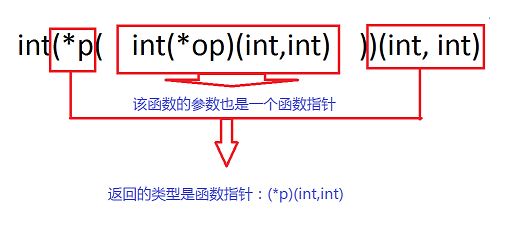- 函数指针作为参数
1 #include <stdio.h> 2 #include <stdlib.h> 3 #include <Windows.h> 4 5 int add(int a, int b) 6 { 7 return a + b; 8 } 9 10 int sub(int a, int b) 11 { 12 return a - b; 13 } 14 15 int mul(int a, int b) 16 { 17 return a*b; 18 } 19 20 int chu(int a, int b) 21 { 22 return a / b; 23 } 24 25 //函数指针作为参数 26 int run(int(*p)(int,int), int a, int b) 27 { 28 return p(a, b); 29 } 30 31 void main() 32 { 33 int res = run(add, 10, 2); 34 printf("%d ", res); 35 system("pause"); 36 }
- 函数指针作为返回值
1 //返回一个函数指针 2 //返回的类型是(*p)(int,int) 3 int (*p())(int,int) 4 { 5 return add; 6 }
一个复杂的例子,返回值是函数指针,参数是函数指针

1 //返回一个函数指针 2 //返回的类型是(*p)(int,int) 3 int(*p( int(*op)(int,int) ))(int, int) 4 { 5 return op; 6 } 7 8 void main() 9 { 10 printf("%d ", p(sub)(1,2)); 11 system("pause");
12 }
- typedef 简化函数指针
1 typedef int(*pf)(int, int); 2 pf p1 = add; 3 printf("%d", p1(1, 2));
- 函数指针数组
1 int(**p)(int, int) = (int (*[])(int, int)){ add, sub, mul, chu }; 2 printf("%d ",(*(p+1))(1, 2)); 3 system("pause");
- typedef简化函数指针数组
1 typedef int(**pp)(int, int); 2 typedef int(*px[10])(int, int);
1 pp pp1 = (px){ add, sub }; 2 printf("%d ", pp1[0](2,4));